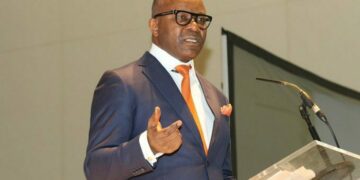Following the backing given to the federal government’s windfall tax by some chairmen of banks, the Bank Directors Association of Nigeria (BDAN) has said the views expressed are personal opinions and do not represent the stance of the entire banking community.
BDAN which is the body of all directors and chairmen of banks in the country in a statement yesterday distanced itself from the controversial views of certain bank chairmen on the proposed foreign exchange windfall tax, indicating a deepening divide within the banking industry.
Chairman of BDAN Mustafa Chike-Obi, who is the chairman of the board of Fidelity Bank in a post on his X(Twitter) account assured the public that its official position will be made known after its scheduled board meeting on August 12th, 2024 leaving many speculating about the outcome.
He stated in the post, “I have read the personal views of some bank chairmen on the windfall tax issue. Those views do not represent the banking community. BDAN will communicate its views after our board meeting on the 12th, on this and other very important issues concerning our community.”
Recall that some bank chairmen have voiced support for the recent amendment of the Finance Bill, which retrospectively imposes a 50 per cent levy (approved at 70% by the National Assembly) on foreign exchange (FX) gains reported by banks in their 2023 annual financial statements.
Among the prominent supporters was Femi Otedola, Chairman of FBN Holdings and an influential figure in the Nigerian financial and capital markets, who endorsed the new policy of the Bola Tinubu administration. Otedola also criticised bank officials for profligacy and extravagant spending, including the purchase and maintenance of private jets.
“Nigerian banks are spending an estimated $50 million annually just on maintaining private jets, with over $500 million spent on purchasing nine private jets by four banks,” Otedola said in a recent statement.
“This level of extravagance significantly erodes public trust in our financial institutions and diverts crucial resources away from vital areas such as operational efficiency, technological innovation, and customer service.”
Chairman of the United Bank for Africa, Tony Elumelu also approved of the move, saying it was aimed at alleviating poverty, saying there was a need to “democratise prosperity for Nigerians, ensuring access to a good life for all.
According to Elumelu, “We support the government’s intention to alleviate poverty with the windfall tax, but we also believe that no one segment should suffer, and the government should continue to create jobs while businesses thrive,” he said.
“‘Mutual prosperity is key – prosperity for business owners, ordinary Nigerians, and foreign and local investors. Everyone should be happy. I’m pleased with the meeting’s outcome, and I hope for a better and happier society going forward,” Elumelu added.
This followed a meeting that the government held on Wednesday with banking sector representatives, led by Elumelu and Group CEO of FCMB, Ladi Balogun, to discuss the windfall tax.
The meeting was described as “amicable, knowledge-based, and data-driven” by Finance Minister Wale Edun, who noted that President Bola Tinubu was actively engaged in the discussion
The Finance Act (Amendment) Bill 2024, passed by the House of Representatives on Tuesday, July 23, 2024, stipulates in Section 2, subsection 31(a) that the Federal Inland Revenue Service “shall assess the realised profits, collect, account, and enforce payment of tax payable under section 30.”
This is in accordance with the powers of the Service under the Federal Inland Revenue Service (Establishment) Act 2007. Section 31(b) further allows the Service to enter into a deferred payment agreement with assessed banks, provided that such an agreement is executed on or before December 31, 2024.
Unlike oil sector windfall taxes, which result from external economic factors like a major rise in international oil prices, the Nigerian FX windfall tax is the consequence of an internal government decision to harmonise exchange markets, thereby devaluing the domestic currency. This has led to a restatement of corporate comprehensive incomes for the previous year.
Proshare Research, a financial intelligence company based in Lagos, in its analysis titled “The Pains of A Windfall Tax: Appraising the NASS’s Financial Act Amendment,” explained that Nigerian banks would need to pay tax arrears on liabilities for 2023, requiring a restatement of their accounts by the end of December 31, 2024.
Additionally, subsection 30 has been revised to extend the implementation period to the 2025 financial year. According to the subsection, a 70 per cent levy shall be imposed and paid to the benefit of the Federal Government of Nigeria on realised profits from all foreign exchange transactions of banks for the 2023 to 2025 financial years. The penalty for non-compliance with the Act would be an additional liability of 10 per cent “of the tax withheld or not remitted per annum, and interest at the prevailing Central Bank of Nigeria minimum rediscount rate,” as well as imprisonment of the principal officers for up to three years.,





